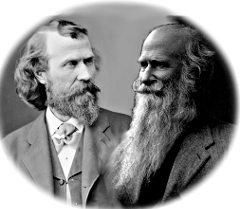Did Joaquin Miller Improve With Age?

Late in life, he rewrote one of his early poems
Did he improve it?
Miller did two different versions of Kit Carson's Ride some twenty years apart. In the original version written in the early 1870s, Carson leaves his girl to die in a fire while he escapes. This went over OK in England but it didn't play so well in America which expected its heroes to behave heroically, especially in fiction. Sometime between then and the publication of "The Complete Poetical Works of Joaquin Miller," he extensively rewrote the poem to make it more acceptable to Americans. In this version he saves the girl. I am not sure when he made these changes but I think they were around the time of publication of "The Complete Poetical Works" in 1896. Therefore there would be about 25 years more experience behind the second version. The question is "How much better is the later version than the original?"
The plot changed
The poetry did not
Unfortunately the answer is "Not a whole lot better." I noted last week that Miller's rhyming scheme and meter in the original version was pretty ragged. So how much difference has 20 year's experience made? Here's the rhyme pattern for the new version:
- AABBAABBCCDEEF
- AABB
- AABBCCDCDEEAFAFGHGH
- ABBACDACEDDBFFEEEBGHHIIG
- AABCDDCDB
- ABBA
- ABBBCDDCEFGFEGHHII
- ABCBCDCEEFF
There is no word for this style of rhyming and, as can be seen, each stanza is a different length. I will not try to analyse the meter except to note that it is equally ragged. As for changes to the body of the poem, they are rather limited. He adds an introductory stanza that appears to be taken from another poem entirely then begins with four new lines that set up the denouement. Then he cuts the last stanza just as the girl is lost and rescues her in the space of one line and ends the poem just two lines later. Actually, this version is much more about the horse than the girl.
Older, but better?
Or was he even trying to write poetry?
The rest of the changes are slight. He changes "blown from a reed" to "both trumpet and reed." He cuts quite a bit some of which wasn't bad but was unnecessary. He does introduce some peculiar punctuation such as replacing many "ed" endings with "'d" and starting each stanza with an opening quote with no closing quote. I don't know whether there is some purpose here or just whimsy. All in all I have to allow that while the second version may have been more popular with American audiences, as poetry it is not markedly superior to the original. Here may be the key too Miller's whole career: He cared about popularity not poetry. As long as something got published and noticed, it was good enough. If his audience did not like the ending, he would change it. But he shows no interest in polishing and refining what was in all fairness a fairly slipshod work into something better. Struggling with a line to find exactly the right word or the perfect phrase to capture some subtle emotional color was not something Miller considered important.
Being a POET
Instead of being a writer of poetry
I have to concede that Miller was not much of a poet. He just doesn't seem to care about many of the things that make poetry poetic. I would say that artistically his prose generally was superior to his poetry. "Last Man at Mexican Camp" is a pretty good story and well told. Some of his other stuff can be entertaining in spite of its rough edges. But if there is any reason to pay attention to Miller today, it is for the man himself rather than his work. He is a highly unusual character more so in his own time than in ours. His story spans some crucial but evanescent periods in the history of America. He illuminates some scenes as no one else did. His early life and adventures in the gold fields was the authentic pioneer experience. His later years include encounters with historically important figures ranging from Rossetti to Miriam Florence Squirer Leslie and Adah Isaacs Menken.
He wrote mediocre poetry
But he made a remarkable life
Yet the man receives less attention than he deserves. One reason is that he seems to antagonize other writers more than is justified. He is attacked because "With Walker in Nicaragua" is not factual when he never claimed it was. All his narrative poems which were the poetic form he devoted the most energy to are all entirely fictional and were not meant to be taken as history any more than was "Hiawatha." He is called a philanderer is spite of the fact that, although he had many flaws, as far as I know cheating was not one of them. His sexuality would be an interesting study but as far as I know he was serially mongamous. He had some virtues too. He spoke up for the Indians at a time when it was neither customary nor safe. He was an early proponent of conservation and seldom harsh in his judgements.The biggest problem with assessing Miller today is that there is little to draw on. Most of his books are hard to find, there is little scholarship about him and even the few biographies are as unreliable as their subject. It is definitely true that many people who are rembered today in artistic and literary circles liked Joaquin Miller and actively sought his company and supported his career. If we want to understand the artistic and cultural life of nineteenth century America we need to understand why this was so.
